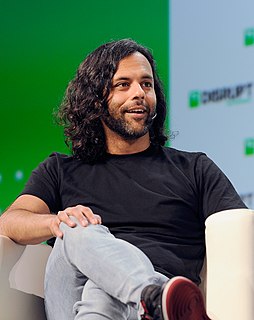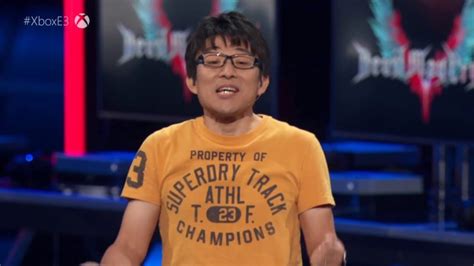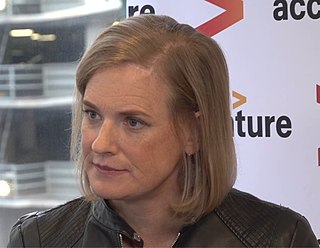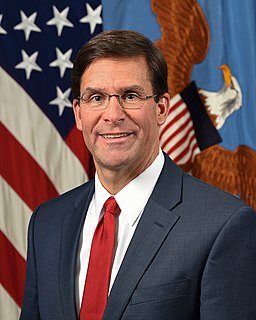Top 310 AI Quotes & Sayings
Explore popular AI quotes.
Last updated on April 14, 2025.
AI works really well when you couple AI in a raisin bread model. AI is the raisins, but you wrap it in a good user interface and product design, and that's the bread. If you think about raisin bread, it's not raisin bread without the raisins. Right? Then it's just bread, but it's also not raisin bread without the bread. Then it's just raisins.
If we can make computers more intelligent - and I want to be careful of AI hype - and understand the world and the environment better, it can make life so much better for many of us. Just as the Industrial Revolution freed up a lot of humanity from physical drudgery I think AI has the potential to free up humanity from a lot of the mental drudgery.
Artificial intelligence uses a complex set of rules - algorithms - to get to a conclusion. A computer has to calculate its way through all those rules, and that takes a lot of processing. So AI works best when a small computer is using it on a small problem - your car's anti-lock brakes are based on AI. Or you need to use a giant computer on a big problem - like IBM using a room-size machine to compete against humans on Jeopardy in 2011.
There's a great phrase, written in the '70s: 'The definition of today's AI is a machine that can make a perfect chess move while the room is on fire.' It really speaks to the limitations of AI. In the next wave of AI research, if we want to make more helpful and useful machines, we've got to bring back the contextual understanding.
The way AI complements people's work, it actually creates a lot of new jobs, a lot of demand. For example, if a automatic visual inspection technology helps spot flaws in manufacturing parts, I think that in some cases, this does create a lot more demand for people to come in to rework or to fix some of the parts that an AI has found to be flawed.
As the founding lead of the Google Brain team, former director of the Stanford Artificial Intelligence Laboratory, and now overall lead of Baidu's AI team of some 1,200 people, I've been privileged to nurture many of the world's leading AI groups and have built many AI products that are used by hundreds of millions of people.
Ne reprenez, dame, si j'ai aime , Si j'ai senti mille torches ardentes, Mille travaux, mille douleurs mordantes, Si, en pleurant, j'ai mon temps consume . Do not blame me, madam, if I loved, If I felt one thousand burning torches, One thousand labours, or one thousand scathing pains, If, in crying, I spent all my time.
One of my relatives had been asking me on how he could break into AI. For him to learn AI - deep-learning, technically - a lot of facts exist on the Internet, but it is difficult for someone to go and read the right combination of research papers and find blog posts and YouTube videos and figure out themselves on how to learn deep-learning.
Everything that civilisation has to offer is a product of human intelligence; we cannot predict what we might achieve when this intelligence is magnified by the tools that AI may provide, but the eradication of war, disease, and poverty would be high on anyone's list. Success in creating AI would be the biggest event in human history. Unfortunately, it might also be the last.
Deep-learning will transform every single industry. Healthcare and transportation will be transformed by deep-learning. I want to live in an AI-powered society. When anyone goes to see a doctor, I want AI to help that doctor provide higher quality and lower cost medical service. I want every five-year-old to have a personalised tutor.
I think that solving the job impact of AI will require significant private and public efforts. And I think that many people actually underestimate the impact of AI on jobs. Having said that, I think that if we work on it and provide the skill training needed, then there will be many new jobs created.
There are two companies that the AI Fund has invested in - Woebot and Landing AI - and the AI Fund has a number of internal teams working on new projects. We usually bring in people as employees, work with them to turn ideas into startups, then have the entrepreneurs go into the startup as founders.
I think it's important for us to have a rule that if a system is really an AI bot, it ought to be labeled as such. 'AI inside.' It shouldn't pretend to be a person. It's bad enough to have a person calling you and harassing you, or emailing you. What if they're bots? An army of bots constantly haranguing you - that's terrible.
Scientists need the infrastructure for scientific search to aid their research, and they need it to offer relevancy and ways to separate the wheat from the chaff - the useful from the noise - via AI-enabled algorithms. With AI, such an infrastructure would be able to identify the exact study a scientist needs from the tens of thousands on a topic.
Now with our Software Developer Kit (SDK), any developer can embed Emotion AI into the apps, games, devices, and digital experiences they are building, so that these can sense human emotion and adapt. This approach is rapidly driving more ubiquitous use of Emotion AI across a number of different industries.
What AI could do is essentially be a power tool that magnifies human intelligence and gives us the ability to move our civilization forward. It might be curing disease, it might be eliminating poverty. Certainly it should include preventing environmental catastrophe. If AI could be instrumental to all those things, then I would feel it was worthwhile.
One of the things that Baidu did well early on was to create an internal platform for deep learning. What that did was enable engineers all across the company, including people who were not AI researchers, to leverage deep learning in all sorts of creative ways - applications that an AI researcher like me never would have thought of.





















